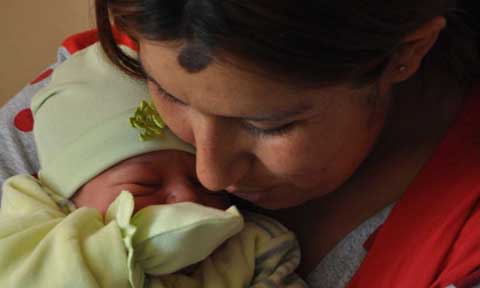More than 1,400 girls are not being born every year in Armenia; their mothers choose to terminate their pregnancies rather than have a female child. It is estimated, that by 2030 Armenia will have approximately 90,000 missing women—women who should have been, but were not, born because of sex-selective abortions.
Statistic shows an un-natural prevalence of boys among the children under 15 years old. According to the 2012 UNFPA study, the sex-at-birth ratio in Armenia reaches 110-120 boys to 100 girls, which exceeds biological average of 102-106 boys to 100 girls. The survey results bear strong evidence that abortions were used to plan for a desired sex.
The practice of sex-selective abortions leads to demographic imbalances and difficulties for men to find wives and contributes to an increase in forced prostitution, trafficking, criminality and human rights violations.
In Armenia, the declining number of women of reproductive age, due to a significant drop in the number of births during the last decade of 20th century, aggravates the situation. This all leads to serious demographic problems for a small country with population of only around three million.
“From my experience of working as a neonatologist at a maternity hospital, I can say that in recent years the number of newborn boys always exceeds the number of girls born on the same day,” says Naira Gharakhanyan, World Vision Armenia Health Policy and Quality Assurance Expert.
“The participants of World Vision’s workshops on women’s reproductive health admit that sex-selective abortions are common practice in their communities, particularly in case of the third or fourth child, “ says Ruzanna Manukyan, World Vision Armenia’s Health Projects Coordinator. “Very often husbands persuade their wives to terminate the pregnancy due to the future child’s sex,” she adds.
Anahit, 22, lives in a village near the town of Talin, in northwest Armenia. She is a mother of a 3-year-old girl, and already had two sex-based abortions. Her husband and family approved of her actions. “I don’t want any more girls,” Anahit says. “Sons continue the family line. If I get pregnant with a girl, I will have an abortion again.”
Nora, 28, who had four abortions based on the future child’s sex, agrees: “Sons are better. Probably because they are heirs of a family.”
Mariam, 27, a mother of three girls, is determined to have a son. Mariam had five sex-selective abortions, although cannot explain the reason why she thinks that boys are better than girls. “It is very difficult to support many children. I am prepared to have more abortions, until I get pregnant with a boy.”
The reasons for prenatal sex selection lie within the traditions of Armenian society that gives strong preference to sons. The main reasons for such attitudes are that sons continue family lineage, inherit property and take care of parents in their old age. Many believe that daughters have fewer opportunities in life and have to endure hardships related to childcare and household responsibilities, while men have more power within a family, and play much more active role in the society. According to the UNFPA study, the son preference in Armenian families is six times higher than the daughter preference.
Although, when born, girls and boys are treated equally by their families, which means that the reasons for the son bias is mostly linked to women’s vulnerability in society. The 2011 resolution of the Parliamentary Assembly of the Council of Europe expressed concern over the skewed sex ratios at birth in Albania, Armenia, and Azerbaijan and condemned the practice of prenatal sex-selection. In particular, the document called on to the authorities of Armenia to investigate the reasons behind skewed sex ratios at birth, organise and support public awareness-raising initiatives on prenatal sex selection, and its consequences and increase the efforts to raise the status of women in society.
The Armenian authorities are currently considering a legislation banning gender detection before the 22nd week of pregnancy, and plan to hold extensive discussions with local and international organisations and media before finalizing the document and submitting it to the Parliament for approval.
Although, some experts believe that such a ban would only create corruption risks and would contribute to an increase in the number of late term abortions or those induced at home with the use of misoprostol, an ulcer drug that can cause pregnancy termination.
Garik Hayrapetyan, Assistant Representative of the United Nations Population Fund in Armenia, in a recent interview with EurasiaNet.org said Armenia needed to “examine international experience” first before making a decision on banning gender detection.
The evidence from India and China confirms that such bans are rarely enforced. As a result, many experts agree that alternative measures that could encourage parents expecting girls could give better results. Hayrapetyan suggests allocating state funds to cover education expenses for girls or paying larger bonuses for the birth of a female child.
“The problem requires combined efforts on state, institutional and community levels. Government, health institutions, media, and NGOs should work together to raise awareness and educate people on harmful consequences of sex selective practices,” Naira Gharakhanyan says.
World Vision has been actively participating in the activities and discussions concerning selective abortions, and will continue to work closely with the government as well as local and international organisations on the ways to achieve a balanced sex ratio in Armenia. As part of a new two-year program on maternal and child health, funded by World Vision Germany and implemented in three ADPs, World Vision Armenia is taking proactive steps to address the situation on a community level. The program will include educational workshops for healthcare providers, production and distribution of public service advertisements and awareness-raising campaigns and activities.
On a long-term scale, World Vision will work towards prioritizing the issue of sex-selective abortions as a ministry focus and mainstreaming it into new programmes. A range of activities, including: the publication of relevant materials, workshops, discussions and other events, will focus on increasing the capacity of World Vision’s staff and key partners (community-based organisations, health and social workers, Church and media) in addressing the issues of sex-selective abortions. World Vision will undertake actions to change attitudes towards sex selection through mass media, Church-led advocacy, etc., and will advocate for healthy and transformed family relations and societal values to contribute to reduced incidence of sex-selective abortions.
WORLD VISION ARMENIA



















